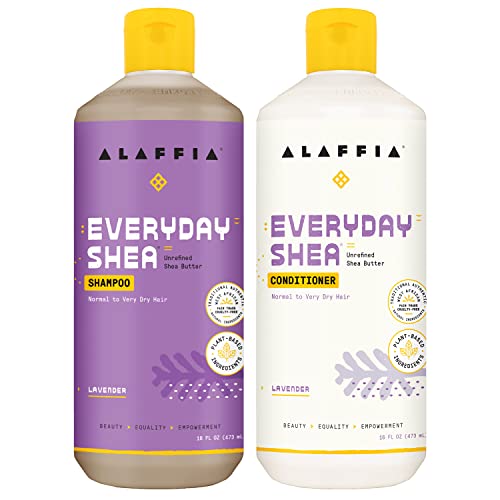
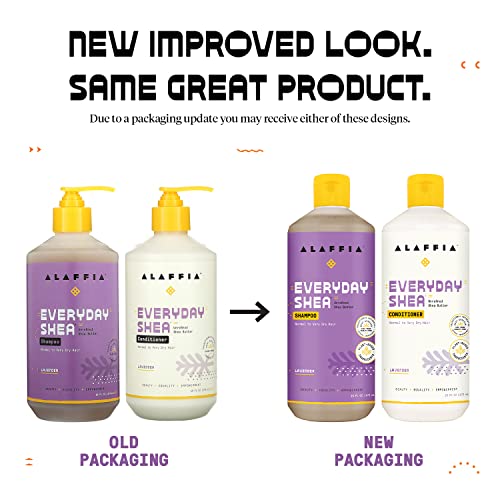
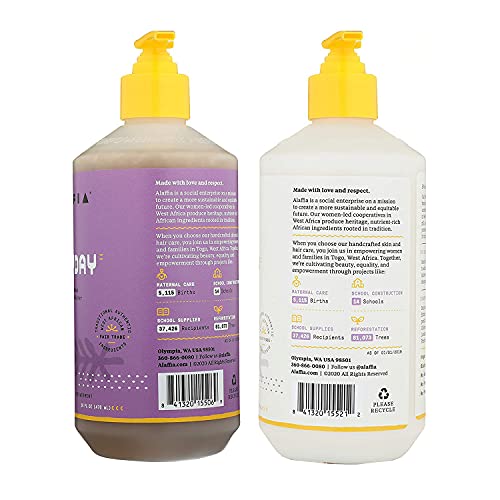
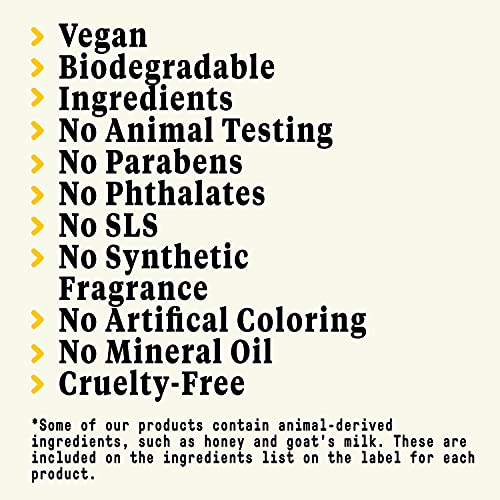
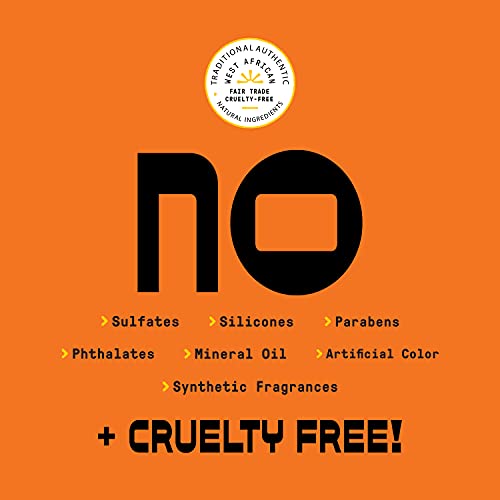

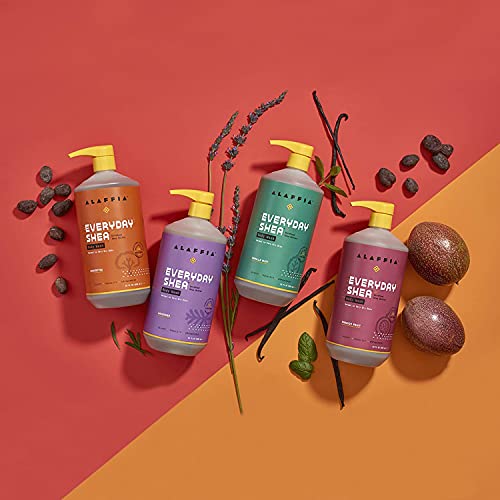
Alaffia EveryDay Shea Shampoo & Conditioner Set - Nourishing, Lavender Scent, 16 Fl Oz Each


Cocamidopropyl Betaine
High RiskCocamidopropyl betaine is a synthetic surfactant derived from coconut oil, commonly used in personal care products for its mild cleansing and foaming properties. It functions as a surfactant, emulsifier, and thickening agent, contributing to the texture and performance of formulations.
Sustai Insights
Cocamidopropyl betaine offers functional benefits as a gentle surfactant, enhancing product foaming and texture. However, it may pose low to moderate allergenic risks and is subject to high use restrictions due to contamination concerns. Regulatory bodies have advised on its safe levels of usage, categorizing its risk level as high overall. Users should practice caution, particularly with sensitive populations, and consider alternatives like naturally derived surfactants for safer formulations.
Behentrimonium Chloride
High RiskBehentrimonium chloride is a quaternary ammonium compound primarily used as a conditioning agent in hair and skin care products. It functions as an emulsifier and surfactant, helping to improve texture and manageability of hair.
Sustai Insights
Behentrimonium chloride offers functional benefits as a hair conditioner and emulsifier. However, it is associated with moderate allergenic potential and has high use restrictions due to regulatory concerns. It poses low risks for carcinogenicity and developmental toxicity but has been noted for neurotoxicity. Environmental risks include potential pollution and low biodegradability. Overall, the ingredient is assessed as high risk, and users should consider alternatives such as natural conditioners.
Potassium Sorbate
Medium RiskPotassium sorbate is a potassium salt of sorbic acid, primarily used as a preservative in food and cosmetic products. It inhibits the growth of molds, yeast, and some bacteria, extending the shelf life of products. It is commonly found in various formulations due to its effectiveness and low toxicity.
Sustai Insights
Potassium sorbate serves as an effective preservative, preventing microbial growth in food and cosmetic products, which is vital for safety and longevity. Although it has a low risk of carcinogenicity and developmental toxicity, there is a moderate concern regarding allergies and immunotoxicity. Environmentally, it poses minimal risks as it is not significantly bioaccumulative. Regulatory agencies have verified its use, although some products may face restrictions. Overall, it is assessed as a medium risk ingredient, with safe usage practices recommended, and alternatives such as natural preservatives could be considered.
Phenoxyethanol
Medium RiskPhenoxyethanol is a preservative used in cosmetics and personal care products to prevent microbial growth and extend shelf life. It is commonly found in formulations such as lotions, creams, and serums.
Sustai Insights
Phenoxyethanol serves effectively as a preservative, ensuring product stability and safety by inhibiting microbial growth. It is considered to have low health risks regarding carcinogenicity, allergies, and reproductive toxicity. However, moderate use restrictions exist, and regulatory bodies have advised caution in specific applications. Environmental concerns include its potential as a pollutant, although it is not highly bioaccumulative. Overall, the ingredient presents a medium risk level, with safe usage practices recommended and alternative preservatives available for those seeking greener options.
Emulsifying Wax
Medium RiskEmulsifying wax is a mixture derived from plant and synthetic sources, primarily used to stabilize emulsions in cosmetic and personal care products. Its primary function is to blend oil and water-based ingredients, ensuring a uniform consistency and enhancing product texture.
Sustai Insights
Emulsifying wax offers functional benefits as an effective emulsifier, helping to create stable formulations in cosmetic products. It generally poses low health risks, with minimal concerns regarding carcinogenicity and allergenic potential. Environmental risks are also low, with no significant pollutant or bioaccumulation issues. However, use restrictions exist, and irritation potential is noted for sensitive skin. Regulatory assessments indicate it is safe for use within established concentration limits, leading to an overall moderate risk assessment. Alternatives like plant-based emulsifiers may offer sustainable options.
Butyrospermum Parkii (Shea) Butter
Low RiskButyrospermum parkii (shea) butter is a vegetable fat derived from the nuts of the shea tree. It is commonly used in cosmetic formulations for its emollient properties, providing moisture and improving skin texture. Additionally, shea butter is known for its ability to enhance the stability of products and deliver a creamy texture.
Sustai Insights
Shea butter offers functional benefits as an effective moisturizer, enhancing skin barrier function and texture. It is sustainably sourced and biodegradable, contributing to eco-friendliness. Health-wise, it is associated with low risks for carcinogenicity, allergies, and reproductive toxicity. Environmental impacts are minimal, with no significant pollutant potential identified. Regulatory assessments indicate no current restrictions. Overall, the ingredient presents a low risk, making it a favorable choice in cosmetic formulations.
Cocos Nucifera (Coconut) Oil
Low RiskCocos Nucifera (Coconut) Oil is derived from the kernels of the coconut palm. It is primarily used in cosmetic formulations for its emollient and moisturizing properties, making it suitable for skin and hair care products.
Sustai Insights
Coconut oil serves as an effective moisturizer and emollient, promoting skin hydration and softness. It is sustainably sourced and biodegradable. Health risks are minimal, with low concerns regarding carcinogenicity, allergens, and reproductive toxicity. Environmental impact is also low, as it does not contribute significantly to pollution or bioaccumulation. Regulatory bodies have not issued restrictions on its use. Overall, coconut oil presents a low risk for health and environmental concerns, making it a safe ingredient in cosmetic products.
Cetearyl Alcohol
Low RiskCetearyl alcohol is a mixture of cetyl and stearyl alcohol, primarily used as an emulsifier and thickener in cosmetic formulations. It helps stabilize products, improve texture, and enhance moisturizing properties, making it common in creams and lotions.
Sustai Insights
Cetearyl alcohol offers functional benefits as an effective emulsifier and skin-conditioning agent, contributing to product stability and texture. It is generally recognized as safe, with low concerns for carcinogenicity, allergies, or reproductive toxicity. Environmental risks are minimal, as it is biodegradable and has low pollutant potential. Regulatory bodies have not imposed significant restrictions on its use. Overall, cetearyl alcohol is assessed to carry low risk, making it a suitable ingredient choice in cosmetic products.
Stearic Acid
Low RiskStearic acid is a naturally occurring fatty acid commonly found in animal and vegetable fats. It functions primarily as an emulsifier, thickener, and stabilizer in cosmetic and personal care products, providing texture and consistency.
Sustai Insights
Stearic acid offers functional benefits such as effective emulsification and stabilization of formulations. It is derived from renewable sources and is biodegradable, contributing to its sustainability profile. Health risks are low, with minimal concerns regarding carcinogenicity, allergies, or reproductive toxicity. Environmental risks are also low, with no significant pollutants or bioaccumulation concerns noted. Regulatory bodies, including the FDA, do not impose restrictions on its use. Overall, stearic acid is assessed as low risk, and its safe usage practices are well-established, with no significant alternatives needed.
Decyl Glucoside
Low RiskDecyl glucoside is a glucose-based surfactant derived from natural sources, primarily used as a mild cleansing agent in personal care products. It effectively reduces surface tension, allowing for improved mixing of ingredients and enhanced cleansing properties without stripping natural oils from the skin.
Sustai Insights
Decyl glucoside offers functional benefits as a non-ionic surfactant, making it suitable for sensitive skin formulations. It is biodegradable and derived from renewable resources, supporting sustainability. Health risks are primarily low, with minimal concerns regarding irritation and allergies. Environmental risks are low, as it does not significantly contribute to pollution or bioaccumulation. Regulatory status is generally favorable, with low restrictions noted. Overall, decyl glucoside presents a low risk for use in consumer products, making it a suitable choice for gentle formulations.
Butyrospermum Parkii (Shea) Butter
Low RiskButyrospermum parkii (shea) butter is a vegetable fat derived from the nuts of the shea tree. It is commonly used in cosmetic formulations for its emollient properties, providing moisture and improving skin texture. Additionally, shea butter is known for its ability to enhance the stability of products and deliver a creamy texture.
Sustai Insights
Shea butter offers functional benefits as an effective moisturizer, enhancing skin barrier function and texture. It is sustainably sourced and biodegradable, contributing to eco-friendliness. Health-wise, it is associated with low risks for carcinogenicity, allergies, and reproductive toxicity. Environmental impacts are minimal, with no significant pollutant potential identified. Regulatory assessments indicate no current restrictions. Overall, the ingredient presents a low risk, making it a favorable choice in cosmetic formulations.
Cocos Nucifera (Coconut) Oil
Low RiskCocos Nucifera (Coconut) Oil is derived from the kernels of the coconut palm. It is primarily used in cosmetic formulations for its emollient and moisturizing properties, making it suitable for skin and hair care products.
Sustai Insights
Coconut oil serves as an effective moisturizer and emollient, promoting skin hydration and softness. It is sustainably sourced and biodegradable. Health risks are minimal, with low concerns regarding carcinogenicity, allergens, and reproductive toxicity. Environmental impact is also low, as it does not contribute significantly to pollution or bioaccumulation. Regulatory bodies have not issued restrictions on its use. Overall, coconut oil presents a low risk for health and environmental concerns, making it a safe ingredient in cosmetic products.
Cetearyl Alcohol
Low RiskCetearyl alcohol is a mixture of cetyl and stearyl alcohol, primarily used as an emulsifier and thickener in cosmetic formulations. It helps stabilize products, improve texture, and enhance moisturizing properties, making it common in creams and lotions.
Sustai Insights
Cetearyl alcohol offers functional benefits as an effective emulsifier and skin-conditioning agent, contributing to product stability and texture. It is generally recognized as safe, with low concerns for carcinogenicity, allergies, or reproductive toxicity. Environmental risks are minimal, as it is biodegradable and has low pollutant potential. Regulatory bodies have not imposed significant restrictions on its use. Overall, cetearyl alcohol is assessed to carry low risk, making it a suitable ingredient choice in cosmetic products.
Cocamidopropyl Betaine
High RiskCocamidopropyl betaine is a synthetic surfactant derived from coconut oil, commonly used in personal care products for its mild cleansing and foaming properties. It functions as a surfactant, emulsifier, and thickening agent, contributing to the texture and performance of formulations.
Sustai Insights
Cocamidopropyl betaine offers functional benefits as a gentle surfactant, enhancing product foaming and texture. However, it may pose low to moderate allergenic risks and is subject to high use restrictions due to contamination concerns. Regulatory bodies have advised on its safe levels of usage, categorizing its risk level as high overall. Users should practice caution, particularly with sensitive populations, and consider alternatives like naturally derived surfactants for safer formulations.
Behentrimonium Chloride
High RiskBehentrimonium chloride is a quaternary ammonium compound primarily used as a conditioning agent in hair and skin care products. It functions as an emulsifier and surfactant, helping to improve texture and manageability of hair.
Sustai Insights
Behentrimonium chloride offers functional benefits as a hair conditioner and emulsifier. However, it is associated with moderate allergenic potential and has high use restrictions due to regulatory concerns. It poses low risks for carcinogenicity and developmental toxicity but has been noted for neurotoxicity. Environmental risks include potential pollution and low biodegradability. Overall, the ingredient is assessed as high risk, and users should consider alternatives such as natural conditioners.
Stearic Acid
Low RiskStearic acid is a naturally occurring fatty acid commonly found in animal and vegetable fats. It functions primarily as an emulsifier, thickener, and stabilizer in cosmetic and personal care products, providing texture and consistency.
Sustai Insights
Stearic acid offers functional benefits such as effective emulsification and stabilization of formulations. It is derived from renewable sources and is biodegradable, contributing to its sustainability profile. Health risks are low, with minimal concerns regarding carcinogenicity, allergies, or reproductive toxicity. Environmental risks are also low, with no significant pollutants or bioaccumulation concerns noted. Regulatory bodies, including the FDA, do not impose restrictions on its use. Overall, stearic acid is assessed as low risk, and its safe usage practices are well-established, with no significant alternatives needed.
Potassium Sorbate
Medium RiskPotassium sorbate is a potassium salt of sorbic acid, primarily used as a preservative in food and cosmetic products. It inhibits the growth of molds, yeast, and some bacteria, extending the shelf life of products. It is commonly found in various formulations due to its effectiveness and low toxicity.
Sustai Insights
Potassium sorbate serves as an effective preservative, preventing microbial growth in food and cosmetic products, which is vital for safety and longevity. Although it has a low risk of carcinogenicity and developmental toxicity, there is a moderate concern regarding allergies and immunotoxicity. Environmentally, it poses minimal risks as it is not significantly bioaccumulative. Regulatory agencies have verified its use, although some products may face restrictions. Overall, it is assessed as a medium risk ingredient, with safe usage practices recommended, and alternatives such as natural preservatives could be considered.
Phenoxyethanol
Medium RiskPhenoxyethanol is a preservative used in cosmetics and personal care products to prevent microbial growth and extend shelf life. It is commonly found in formulations such as lotions, creams, and serums.
Sustai Insights
Phenoxyethanol serves effectively as a preservative, ensuring product stability and safety by inhibiting microbial growth. It is considered to have low health risks regarding carcinogenicity, allergies, and reproductive toxicity. However, moderate use restrictions exist, and regulatory bodies have advised caution in specific applications. Environmental concerns include its potential as a pollutant, although it is not highly bioaccumulative. Overall, the ingredient presents a medium risk level, with safe usage practices recommended and alternative preservatives available for those seeking greener options.
Emulsifying Wax
Medium RiskEmulsifying wax is a mixture derived from plant and synthetic sources, primarily used to stabilize emulsions in cosmetic and personal care products. Its primary function is to blend oil and water-based ingredients, ensuring a uniform consistency and enhancing product texture.
Sustai Insights
Emulsifying wax offers functional benefits as an effective emulsifier, helping to create stable formulations in cosmetic products. It generally poses low health risks, with minimal concerns regarding carcinogenicity and allergenic potential. Environmental risks are also low, with no significant pollutant or bioaccumulation issues. However, use restrictions exist, and irritation potential is noted for sensitive skin. Regulatory assessments indicate it is safe for use within established concentration limits, leading to an overall moderate risk assessment. Alternatives like plant-based emulsifiers may offer sustainable options.
Decyl Glucoside
Low RiskDecyl glucoside is a glucose-based surfactant derived from natural sources, primarily used as a mild cleansing agent in personal care products. It effectively reduces surface tension, allowing for improved mixing of ingredients and enhanced cleansing properties without stripping natural oils from the skin.
Sustai Insights
Decyl glucoside offers functional benefits as a non-ionic surfactant, making it suitable for sensitive skin formulations. It is biodegradable and derived from renewable resources, supporting sustainability. Health risks are primarily low, with minimal concerns regarding irritation and allergies. Environmental risks are low, as it does not significantly contribute to pollution or bioaccumulation. Regulatory status is generally favorable, with low restrictions noted. Overall, decyl glucoside presents a low risk for use in consumer products, making it a suitable choice for gentle formulations.
Experience the nourishing power of Alaffia EveryDay Shea Shampoo and Conditioner, perfect for normal to very dry hair. This sulfate-free set is handcrafted with fair-trade unrefined shea butter and virgin coconut oil, delivering gentle cleansing without stripping natural oils. Infused with calming lavender oil, it deeply moisturizes while promoting relaxation during your hair care routine.
- Gentle Cleansing: It cleanses hair while preserving its natural moisture for healthier locks.
- Deep Nourishment: Enriched with shea butter and coconut oil to soften and revitalize hair from root to tip.
- Relaxing Aromatherapy: Lavender oil provides a calming scent, enhancing your daily self-care ritual.
- Ethical Production: Made by women-led cooperatives in West Africa, supporting fair-trade practices and community development.
- Cruelty-Free Commitment: Proudly cruelty-free, ensuring no animals are harmed in the making of these products.
Elevate your hair care routine with this eco-conscious choice, designed for those who value sustainability and health.
Subscribe & Save with Sustai
- Best Price Guarantee: Always enjoy the lowest prices on sustainable home essentials.
- No Surprises: We’ll notify you before shipping. No hidden fees, ever.
- You’re in Charge: Change, pause, or cancel your subscription anytime with ease.
- Eco-Friendly Deliveries: Our grouped shipments mean less packaging and lower emissions.
Join us on a sustainable journey. Special offers for a limited time! Prices and promotions may change.
Recommended Products
Experience the nourishing power of Alaffia EveryDay Shea Shampoo and Conditioner, perfect for normal to very dry hair. This sulfate-free set is handcrafted with fair-trade unrefined shea butter and virgin coconut oil, delivering gentle cleansing without stripping natural oils. Infused with calming lavender oil, it deeply moisturizes while promoting relaxation during your hair care routine.
- Gentle Cleansing: It cleanses hair while preserving its natural moisture for healthier locks.
- Deep Nourishment: Enriched with shea butter and coconut oil to soften and revitalize hair from root to tip.
- Relaxing Aromatherapy: Lavender oil provides a calming scent, enhancing your daily self-care ritual.
- Ethical Production: Made by women-led cooperatives in West Africa, supporting fair-trade practices and community development.
- Cruelty-Free Commitment: Proudly cruelty-free, ensuring no animals are harmed in the making of these products.
Elevate your hair care routine with this eco-conscious choice, designed for those who value sustainability and health.

You can have at most 2 Sustainable Steals products in your cart
Customer Reviews
Customers’ View
Customers generally appreciate the gentle and nourishing properties of the Alaffia Shampoo and Conditioner Set, particularly valuing its sulfate-free formula. Many users have noted that it effectively cleanses without stripping natural oils, making their hair feel soft and hydrated. Positive remarks include how the product supports hair health, with some users experiencing noticeable new hair growth and a moisturized scalp. The use of fair-trade ingredients and cruelty-free practices resonates well with environmentally conscious consumers. However, some reviewers expressed concerns about the fragrance and effectiveness for certain hair types, indicating that experiences may vary. Overall, the product aligns well with the values of sustainability and health, appealing to those seeking eco-friendly personal care options.
AI-generated from the text of customer reviewsThis product is rated 5.0 of 5.0 stars.
It has received 1 review.




